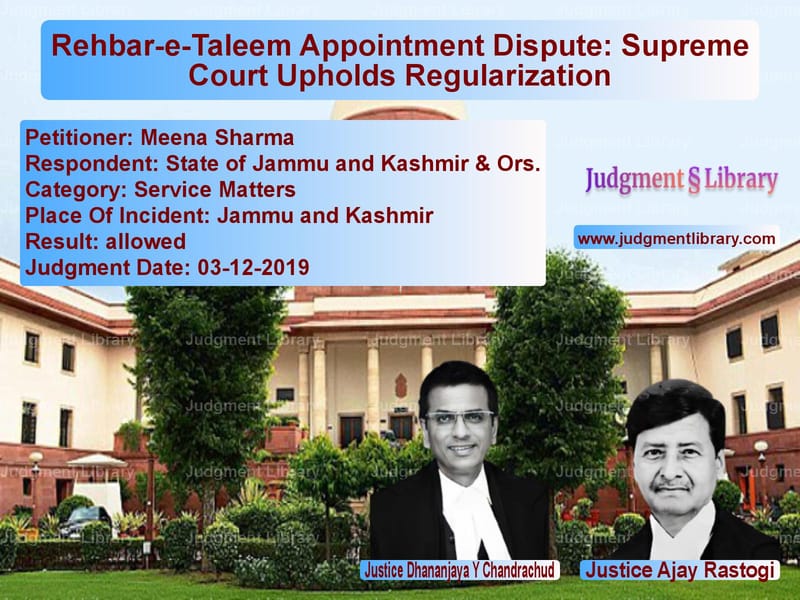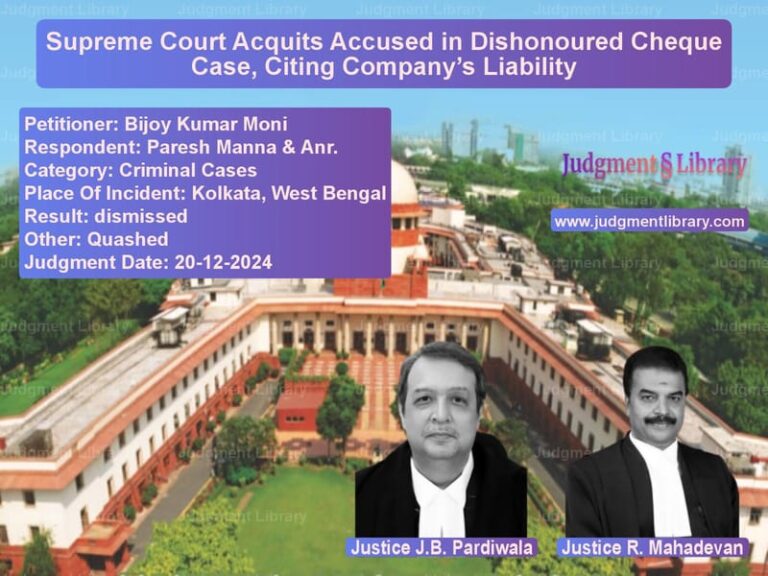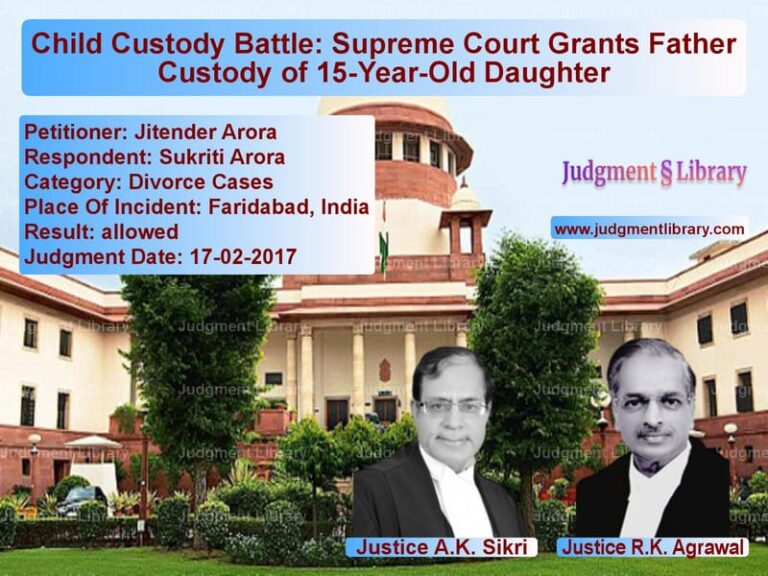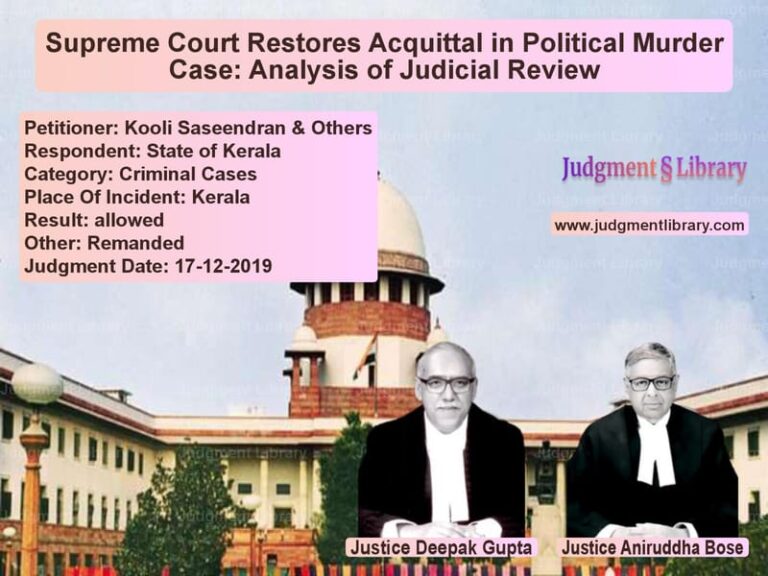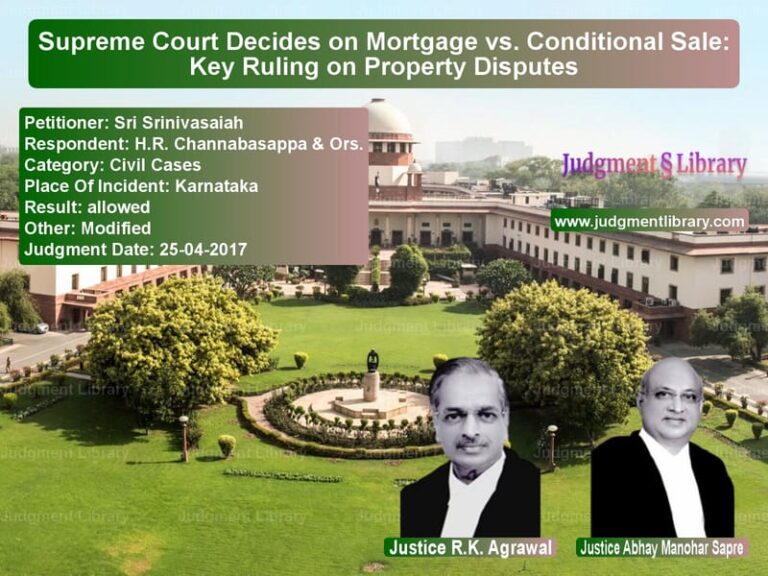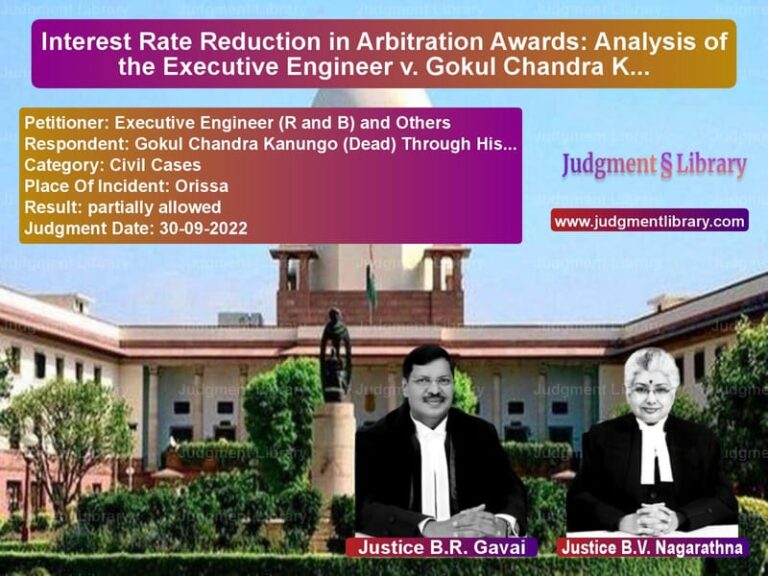Rehbar-e-Taleem Appointment Dispute: Supreme Court Upholds Regularization
The case of Meena Sharma vs. State of Jammu and Kashmir & Ors. is a significant ruling concerning the appointment and regularization of teachers under the Rehbar-e-Taleem (RET) Scheme. The dispute centered around the eligibility of the appellant for appointment under the scheme and the subsequent challenge posed by the respondent, who claimed a prior right to the post.
Background of the Case
The appellant, Meena Sharma, was appointed under the RET Scheme to a teaching position at Government Middle School, Bakore. The appointment was challenged by the respondent, who argued that she had a better claim to the post.
The Rehbar-e-Taleem (RET) Scheme
The RET Scheme was launched by the Government of Jammu and Kashmir on 28 April 2000 with the objective of improving elementary education in rural and border areas. The key objectives of the scheme were:
- Promoting decentralized management of elementary education.
- Ensuring accountability and responsiveness through community participation.
- Filling staffing deficiencies in primary and middle schools.
- Encouraging local community involvement in school administration.
According to the scheme, the appointed teachers (called Rehbar-e-Taleem) were selected through the Village Education Committee (VEC). A candidate had to be a resident of the same revenue village where the school was located.
Arguments by the Appellant
The appellant contended:
- She was selected by a properly constituted panel in December 2002.
- The Village Education Committee (VEC) had considered the fact that her village, Chak Koura, did not have a school, and thus included candidates from both villages (Bakore and Chak Koura).
- The first two selected candidates resigned, after which she was appointed as per the merit list.
- The respondent failed to challenge her appointment in a timely manner, waiting four years before filing a writ petition.
- She had already completed the mandatory five-year period as an RET teacher and was regularized in 2013.
- Over the years, she had continued in service, and removing her now would serve no purpose.
Arguments by the Respondent
The respondent argued:
- Under the RET Scheme, the candidate must be from the same revenue village where the school is located.
- The government had clarified in 2005 that the term “village” in the eligibility criteria meant “revenue village.”
- Since the appellant was not from Bakore, she was ineligible for appointment.
- Her appointment was done under pressure after a contempt petition was filed.
- The selection panel should have included only candidates from Bakore.
- Even though the challenge was made in 2009, the respondent had no knowledge of the appellant’s appointment before that.
High Court Decision
The Jammu and Kashmir High Court ruled in favor of the respondent. It quashed the appellant’s appointment and directed the government to consider the respondent’s claim. The High Court held that:
“The eligibility criteria clearly required that a candidate must belong to the same revenue village as the school. The appointment of the appellant was in violation of this rule.”
Supreme Court’s Analysis and Ruling
The Supreme Court bench, comprising Dr. Dhananjaya Y Chandrachud and Ajay Rastogi, examined the following key issues:
1. Delay in Challenging the Appointment
The Court noted that the respondent waited four years before challenging the appointment. The first writ petition in 2009 did not even implead the appellant. The Court observed:
“The respondent was aware of the Select List but failed to challenge the appointment in time. A delay of four years in contesting the appointment disqualifies her from seeking relief.”
2. Regularization and Passage of Time
The Court emphasized that the appellant had already been regularized in 2013 and had served for over six years since then. Removing her from service would serve no practical purpose.
“The equities have ensued in favor of the appellant, who has been in service for over a decade. The respondent cannot claim a vested right to an appointment based on a Select List from 2003.”
3. Validity of the Combined Select List
The Supreme Court upheld the decision of the Village Education Committee (VEC) to consider candidates from both villages since Chak Koura had no school. It ruled that:
“The decision of the VEC to draw up a combined Select List for Bakore and Chak Koura was bona fide and in the interest of providing education to both villages.”
Final Judgment
The Supreme Court set aside the High Court’s decision and reinstated the appellant’s appointment. The Court held:
“The writ petition filed by the respondent suffered from an unexplained delay. Even on merits, the appointment of the appellant is not vitiated. The respondent cannot claim a right to appointment based on a Select List from 2003.”
The Court concluded that the appellant’s appointment was valid and allowed her to continue in service.
Implications of the Judgment
This ruling has significant implications for service law and administrative fairness:
- Timely Challenge: Individuals must challenge appointments promptly. Delayed challenges weaken their case.
- Regularization Matters: Once an employee has been regularized, courts will be reluctant to overturn appointments.
- Educational Policies: Local governance bodies have discretion in modifying selection criteria based on local needs.
Conclusion
The Supreme Court’s ruling in Meena Sharma vs. State of Jammu and Kashmir ensures that administrative decisions made in good faith are protected. The judgment underscores the importance of equity in service matters and sets a precedent for handling similar disputes in employment and education sectors.
Petitioner Name: Meena Sharma.Respondent Name: State of Jammu and Kashmir & Ors..Judgment By: Justice Dhananjaya Y Chandrachud, Justice Ajay Rastogi.Place Of Incident: Jammu and Kashmir.Judgment Date: 03-12-2019.
Don’t miss out on the full details! Download the complete judgment in PDF format below and gain valuable insights instantly!
Download Judgment: Meena Sharma vs State of Jammu and K Supreme Court of India Judgment Dated 03-12-2019.pdf
Direct Downlaod Judgment: Direct downlaod this Judgment
See all petitions in Employment Disputes
See all petitions in Recruitment Policies
See all petitions in Public Sector Employees
See all petitions in Judgment by Dhananjaya Y Chandrachud
See all petitions in Judgment by Ajay Rastogi
See all petitions in allowed
See all petitions in supreme court of India judgments December 2019
See all petitions in 2019 judgments
See all posts in Service Matters Category
See all allowed petitions in Service Matters Category
See all Dismissed petitions in Service Matters Category
See all partially allowed petitions in Service Matters Category

